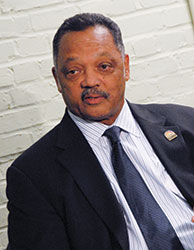National figures visit campus to speak about activism and the arts
Ralph Nader, the Reverend Jesse Jackson, and Harriet Fulbright visited campus this past semester. Read what they had to say.

 In March, Ralph Nader and the Reverend Jesse Jackson urged a Kendall Hall audience to seize an active role in government. In their joint lecture, sponsored by the College Democrats club, Nader and Jackson touched on the issues of economic inequality and mounting unemployment in the manufacturing industry.
In March, Ralph Nader and the Reverend Jesse Jackson urged a Kendall Hall audience to seize an active role in government. In their joint lecture, sponsored by the College Democrats club, Nader and Jackson touched on the issues of economic inequality and mounting unemployment in the manufacturing industry.
Jackson (top left) argued these problems come from a “moral deficit,” decrying the fact that money goes to places like Iraq instead of being used to help this country’s cities. “We must first revive our moral visions of what’s important,” Jackson said.
During the question-and-answer lecture, which was guided by Professor of Philosophy Morton Winston, Nader (middle left) talked about his work as a young lawyer and how he had an obligation to address the “corporate juggernaut.” “The people who are not organized become serfs of those who are organized,” Nader said.
Nader and Jackson also urged the students in the audience to “unlearn” the acceptance of commercial dominance and to not allow their talents to be “trivialized” by dedicating them to corporate or military ends.
Two days later, Harriet Fulbright (bottom left), wife of the late Senator J. William Fulbright, spoke in the Mildred and Ernest E. Mayo Concert Hall about how the arts can be used to develop international understanding. Fulbright also spoke about her time as executive director of the Fulbright Association, and her experiences as executive director of the President’s Committee on the Arts and the Humanities at the White House.
Fulbright’s visit was sponsored by TCNJ’s Center for the Arts. John Laughton, dean of the School of the Arts and Communication, joined Fulbright on stage to direct the proceedings. Afterward, he remarked, “[Ms. Fulbright] emphasized how receiving an education in the arts is fundamental to having a better understanding of all subjects. In her discussion of the Fulbright program, she stressed how these artistic exchanges are crucial; they present a deeper, more genuine, and more realistic picture of who we are as a culture.
Ed’s note: Signal writers Katie Brenzel ’11 and Matt Huston ’12 contributed to this report.
Posted on June 3, 2011

